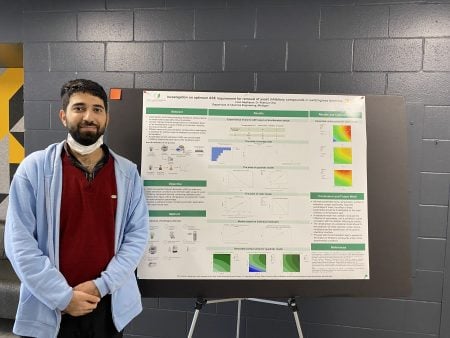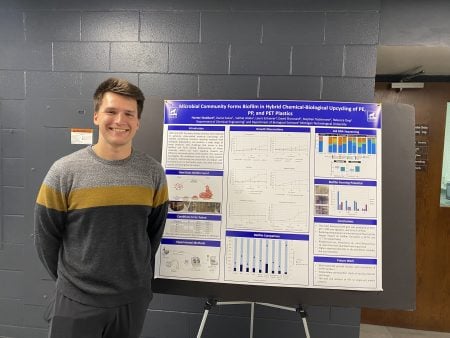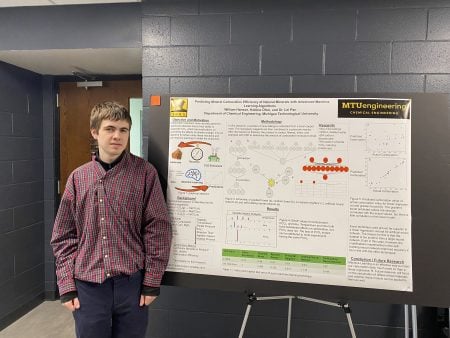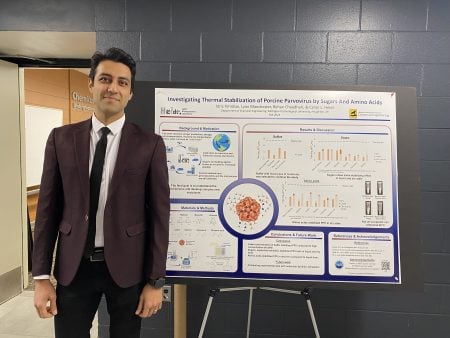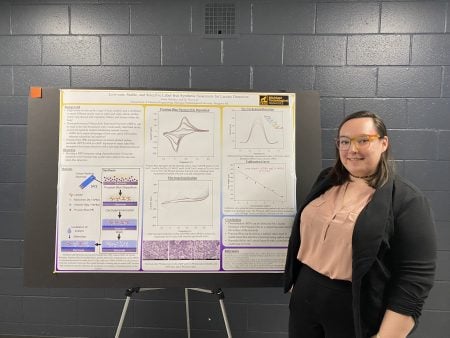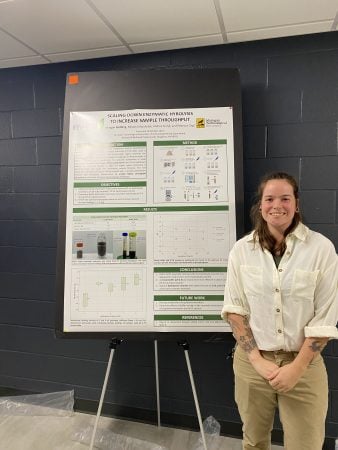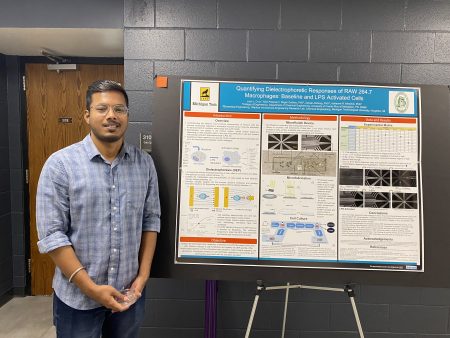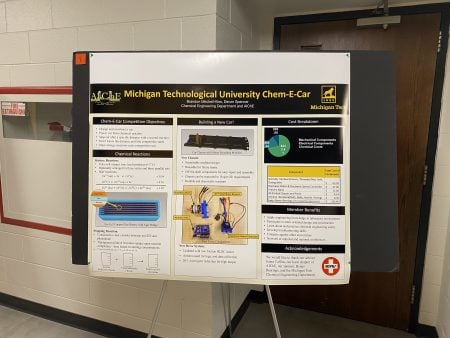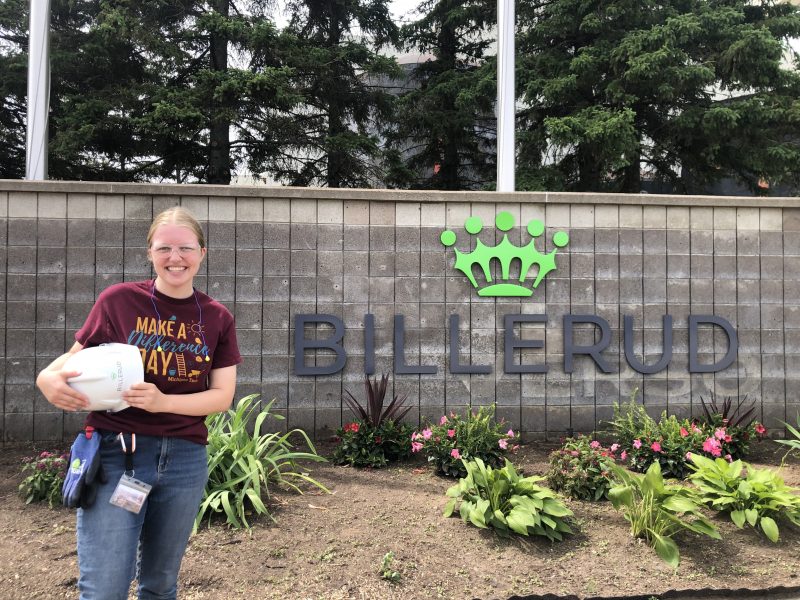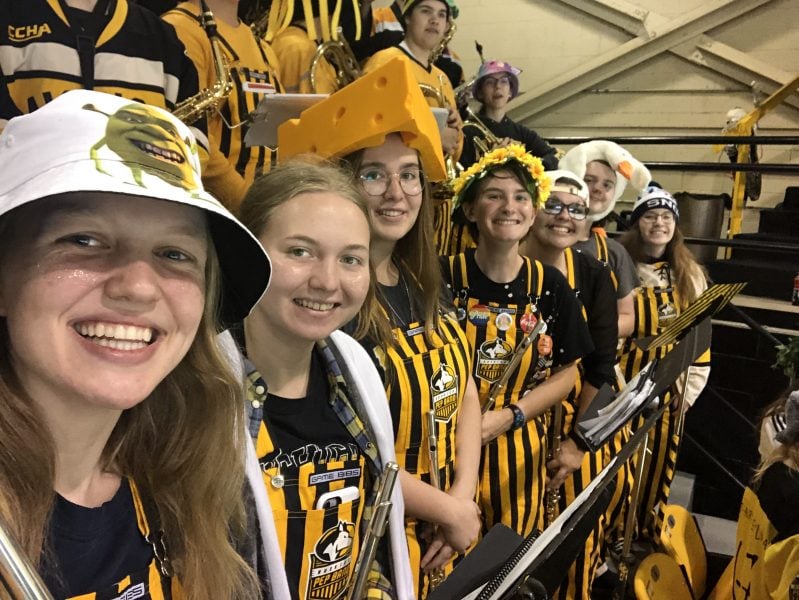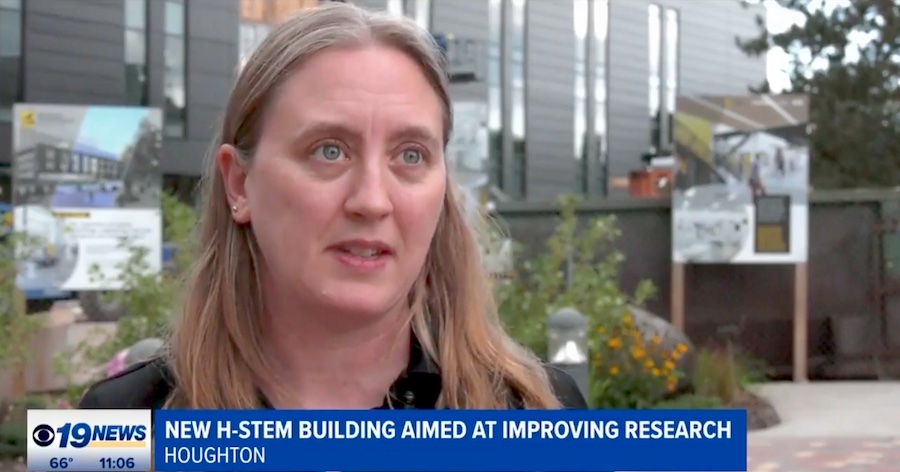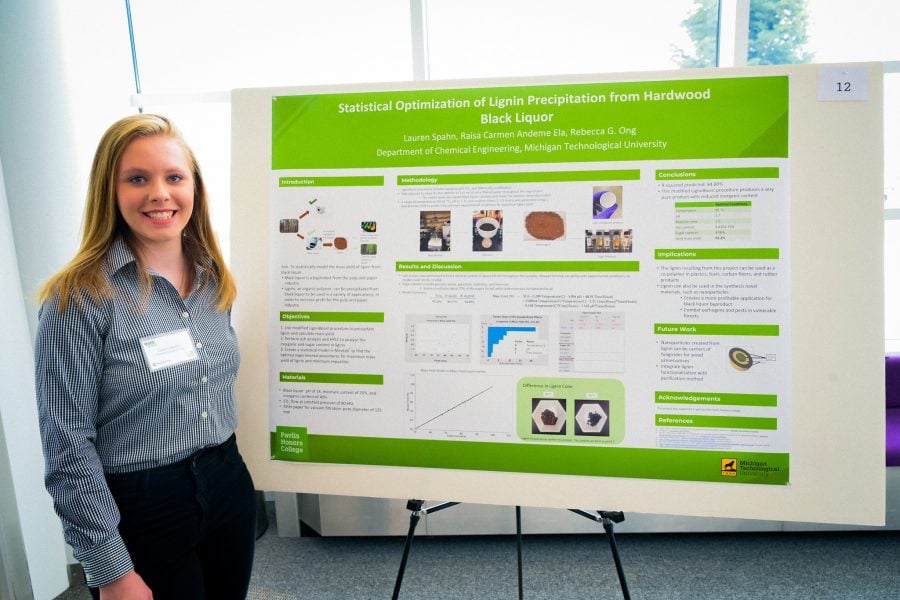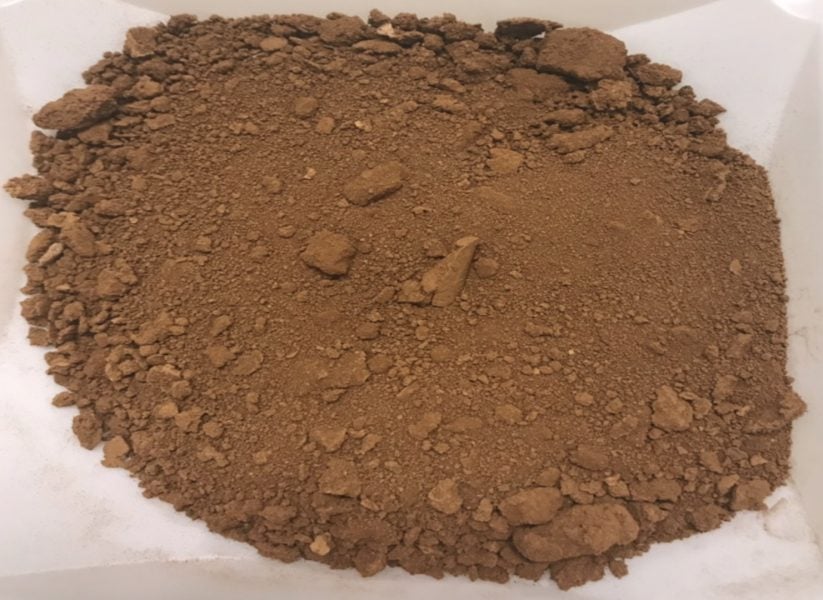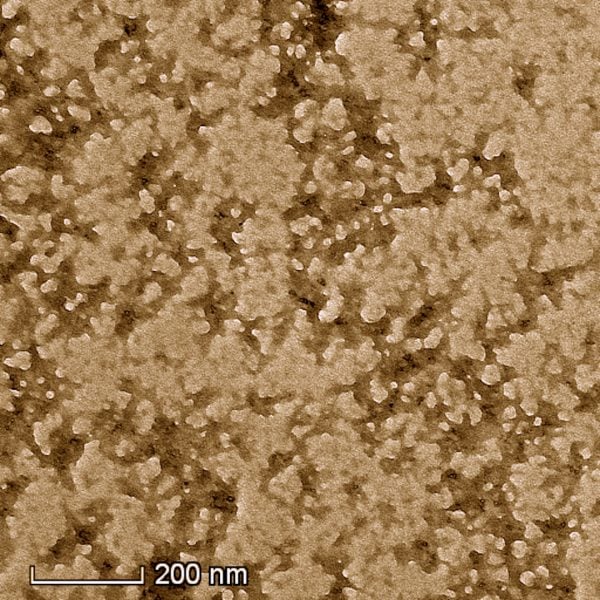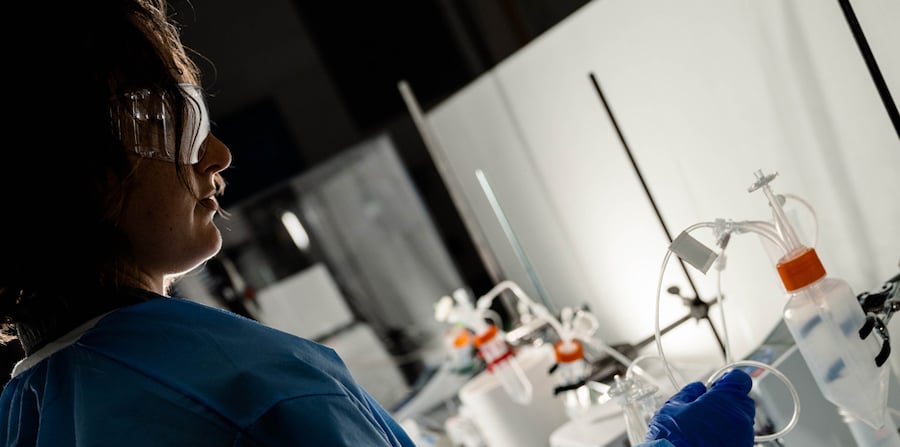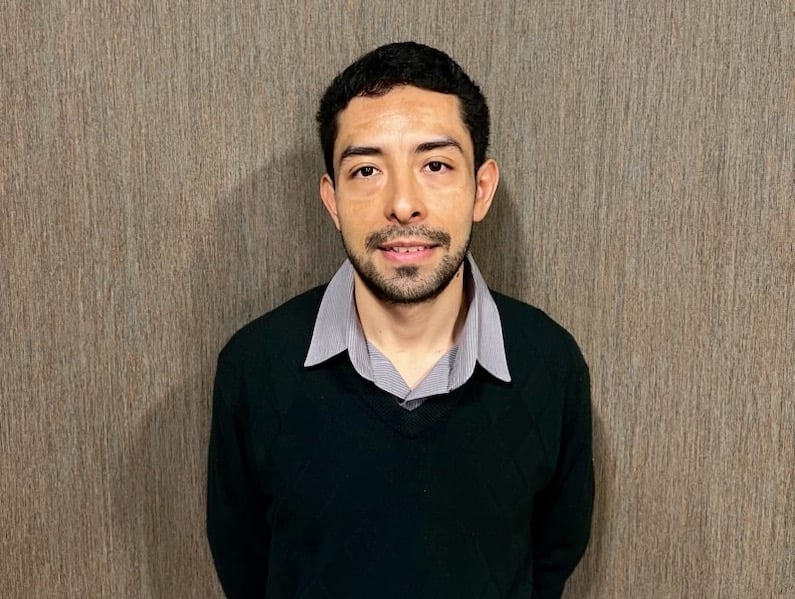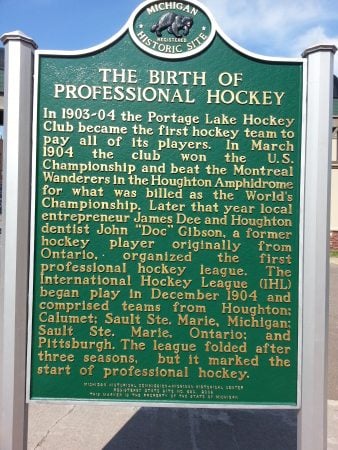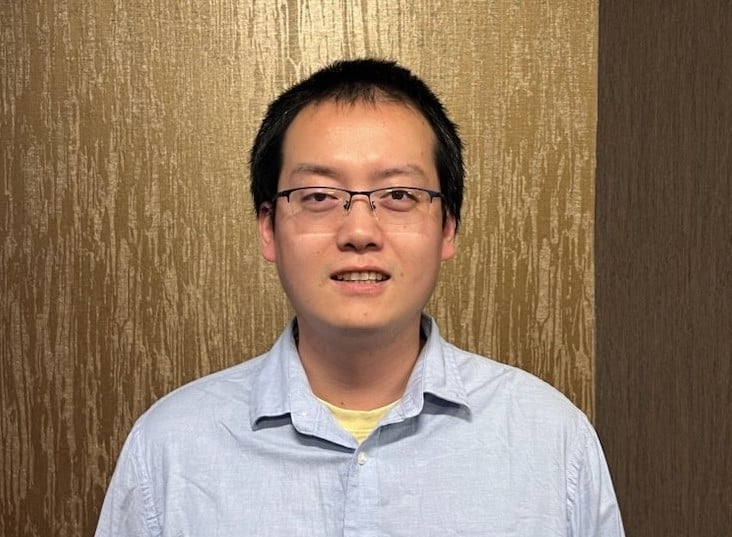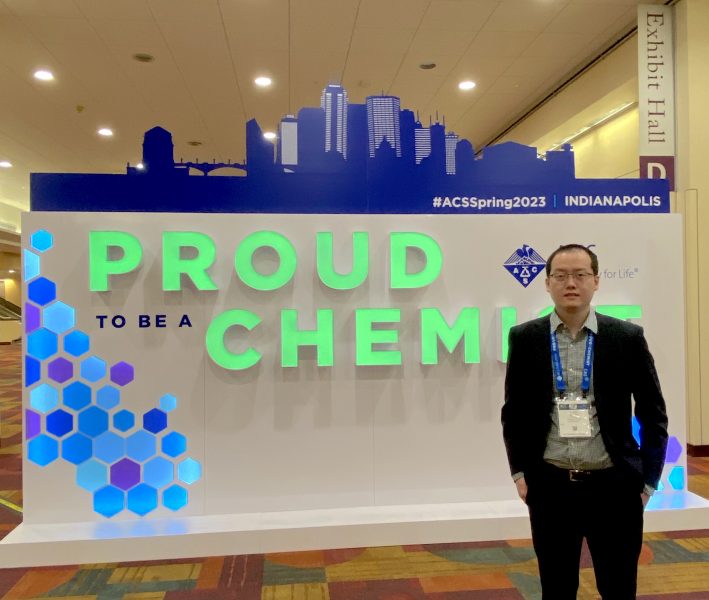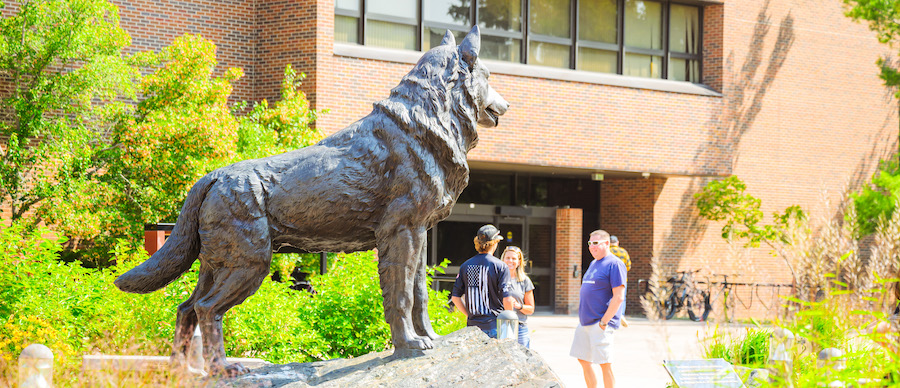The poster session took place on the third floor of the ChemSci building on October 20, with prizes for student organization, undergraduate research, and graduate research.
First Place Graduate Research: Hunter Stoddard, Microbial Community Forms Biofilm in Hybrid Chemical-Biological Upcycling Process
Second Place Graduate Research: Grace Dykstra, Low-cost, Stable, and Selective Synthetic biosensors for Lactate Detection
First Place Undergraduate Research: Prajeet Kadam, Quantifying Dielectrophoretic Responses of RAW 264.7 Macrophages: Baseline and LPS Activated Cells
Second Place Undergraduate Research: Morgan Redding, Low-cost, Stable, and Selective Synthetic biosensors for Lactate Detection
First Place Student Organization: Addymae Palecek, The American Institute of Chemical Engineers (AIChE)
Graduate Research
Poster #1
Optimization of water extraction conditions for removal of yeast inhibitory compounds from switchgrass
Authors: Iman Najafipour, Dr. Rebecca Ong
Abstract: Drought-stressed switchgrass, a potential bioenergy feedstock, often exhibits elevated yeast inhibitor. Effective removal of inhibitory compounds enhances sugar conversion to bioethanol, maximizing energy production, yield, and cost-efficiency. The objective is to optimize Accelerated Solvent Extraction (ASE) for efficient yeast inhibitor extraction, thereby increasing yield while minimizing water consumption. The impact of temperature (A), time (B), and extraction cycles (C) on the extracted mass was investigated using a Box-Behnken model. A, B, C, AB, BC, and CC terms influenced the extraction, aligning well with experimental data. This ongoing project examines how extraction conditions affect yeast inhibition, and fermentation.
Poster #2: First Place Graduate Research
Microbial Community Forms Biofilm in Hybrid Chemical-Biological Upcycling Process
Authors: Hunter Stoddard, Dr. Rebecca Ong
Abstract: Biofilms can form on process equipment and make harvest of the cell biomass challenging. In this study, a microbial consortium was grown on products from pyrolysis and from depolymerization using ammonium hydroxide. Bioreactor conditions were varied to determine the highest production of biomass and the proportion of biomass as a biofilm. It was determined that the most biomass was produced at 30°C, pH 7, 100 rpm agitation, and 10 sL/h airflow. Reducing temperature and increasing aeration had the largest impact on biofilm formation where the percentage of biomass that was attached as biofilm was 20.8% at 30°C and 27.8% at 10 sL/h airflow.
Poster #3
Prediction of ex-situ Direct Carbonation of Natural Minerals using Machine Learning Algorithms
Authors: William Hanson, Dr. Lei Pan
Abstract: Mineral carbonation is a carbon fixation method in which the atmospheric CO2 reacts with alkaline oxide/silicate minerals to form carbonate minerals. In this work, mineral carbonation efficiency for the direct carbonation of various natural silicate minerals was investigated. In addition, carbonation efficiency was modeled using machine learning techniques including gradient boost, random forest, artificial neural network, K-nearest neighbor, and self-building neural network. Among models tested, gradient boost had the lowest error while artificial neural networks had the highest error. The present result is to ensure that industrial-scale carbonation operations will be optimally designed.
Poster #4
Investigating thermal stabilization of porcine parvovirus by sugars and amino acids
Authors: Idris Tohidian, Lynn Manchester, Rohan Chaudhari, Dr. Caryn Heldt
Abstract: Developing thermostable vaccines not only reduces vaccination cost, but also increases their widespread distribution all over the world. To achieve this goal, we focused on unravelling the stabilization ability of four sugars and five amino acids frequently used as additives in biotherapeutic formulations today. Both dry and liquid formulations were explored. The results showed good stabilization effect of sugars in liquid and dry formulations, but the amino acids were able to stabilize porcine parvovirus only in the dry state.
Poster #5: Second Place Graduate Research
Low-cost, Stable, and Selective Synthetic biosensors for Lactate Detection
Authors: Grace Dykstra, Dr. Yixin Liu
Abstract: High lactate levels can be a sign of lactic acidosis and is attributed to sepsis and septic shock, cardiac arrest, lung disease, and trauma within the body. Electropolymerized Molecularly Imprinted Polymers (eMIPs) can be used to develop biosensors with a molecularly imprinted cavity as their recognition element, with major advantages of low-cost, quick fabrication, inherent selectivity, and stability. We can further enhance eMIPs with Prussian blue (PB) nanoparticles deposited on the electrode surface as a redox-active species to create label-free biosensors for lactate detection with a one-step detection.
Undergraduate Research
Poster #6: Second Place Undergraduate Research
Scaling Down High-Solids Enzymatic Hydrolysis to Increase Sample Throughput
Authors: Morgan Redding, Mikayla Marshalek, Andrea Senyk, Dr. Rebecca Ong
Abstract: One approach toward biofuel production requires lignocellulosic biomass to undergo high-solids enzymatic hydrolysis to convert cell wall carbohydrates into fermentable sugars. However, our current process suffers from bottlenecks in sample throughput, limiting the types of experiments we can perform. To overcome bottlenecks in solids separation, enzymatic hydrolysis will be scaled down from 32 mL hydrolysate volume to ~4–10 mL volume to allow for higher speed processing in microcentrifuge and avoid time consuming vacuum filtration. The new enzymatic hydrolysis procedure will be coupled with a revised pretreatment and microplate fermentation to enable higher throughput processing and analysis of diverse lignocellulosic feedstocks.
Poster #7: First Place Undergraduate Research
Quantifying Dielectrophoretic Responses of RAW 264.7 Macrophages: Baseline and LPS Activated Cells
Authors: Prajeet Kadam, Juan Cruz-Moreno, Holly Flores, Nick Peterson, Roger Guillory, Zainab Alshoug, Dr. Adrienne R. Minerick
Abstract: Macrophages are critical effector immune cells that eliminate diseased or damaged cells based on their nascent or activation state (induced via lipopolysaccharide, LPS). Dielectrophoretic (DEP) tools induce cellular charges that probe RAW 264.7 macrophages in baseline and LPS-stimulated states by observing changes in cell morphology and quantifying DEP spectra. This provides insights into cell membrane capacitance, conductivity, and polarizability. A custom-designed microfluidic device precisely controls and monitors the cell during DEP experiments, revealing altered cell morphology, stronger DEP responses at higher voltages, and distinctive responses in LPS-activated macrophages at lower frequencies.
Student Organization
Poster #8: First Place Student Organization, Presenter Addymae Palecek
The American Institute of Chemical Engineers (AIChE)
Authors: Addymae Palecek, Alicia Hinman, Jeffrey Kennedy, Devin Spencer, Brandon Mitchell-Kiss, Jacqui Foreman, Allison Swanson, Danya Salame, Spencer Kaastra, Dr. Jeana Collins
Abstract: The American Institute of Chemical Engineers (AIChE) develops the engineering students at MTU personally and professionally by offering them the opportunity to meet with industry representatives. This connection allows our members to learn about what they do in their role with the company, what their company does, and grow an authentic friendship. AIChE promotes the sharing of knowledge pertaining to the field of chemical engineering and sustainability. This organization has been involved actively in the community, participating in Make a Difference Day and more. AIChE is a Chem-E-Car sponsor; this is a competition where students design a chemical reaction-driven car and compete with other schools at both regional and national levels.
